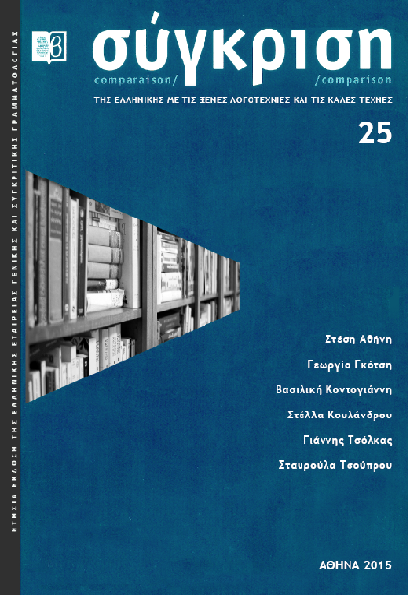Όταν το Τραγικό μεταλλάσσεται σε αναζήτηση του Απόλυτου: Η Μήδεια του Jean Anouilh δίπλα στην ομώνυμη ευριπίδεια ηρωίδα
Abstract
When the Tragic is transformed in search of the Absolute: Anouilh’s Medea next to her tragic predecessor
The article attemps a comparative study of Anouilh’s Medea with Euripides’ tragedy of the same title. More specifically, it examines the different nature of the two heroines, how the ancient heroine fights with herself, while the modern heroine fights with «others», the different kind of loneliness they experience. The article underlines, finally, how the ancient concept of Tragic becomes Absurd in the contemporary drama, as the infanticide of the tragic heroine remains ambiguous, while the modern heroine, «captive» in her absolute worldview (in the author’s repeating absolute worldview), destroys herself and her relatives, unable to find some meaning in life.
Article Details
- How to Cite
-
Κουλάνδρου Σ. (2016). Όταν το Τραγικό μεταλλάσσεται σε αναζήτηση του Απόλυτου: Η Μήδεια του Jean Anouilh δίπλα στην ομώνυμη ευριπίδεια ηρωίδα. Comparison, 25, 71–82. https://doi.org/10.12681/comparison.96
- Issue
- Vol. 25 (2015)
- Section
- Articles

This work is licensed under a Creative Commons Attribution-NonCommercial-ShareAlike 4.0 International License.
Authors who publish with this journal agree to the following terms:
- Authors retain copyright and grant the journal right of first publication with the work simultaneously licensed under a Creative Commons Attribution Non-Commercial License that allows others to share the work with an acknowledgement of the work's authorship and initial publication in this journal.
- Authors are able to enter into separate, additional contractual arrangements for the non-exclusive distribution of the journal's published version of the work (e.g. post it to an institutional repository or publish it in a book), with an acknowledgement of its initial publication in this journal.
- Authors are permitted and encouraged to post their work online (preferably in institutional repositories or on their website) prior to and during the submission process, as it can lead to productive exchanges, as well as earlier and greater citation of published work (See The Effect of Open Access).




